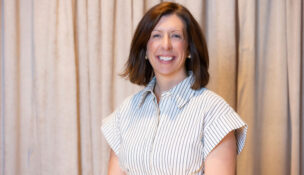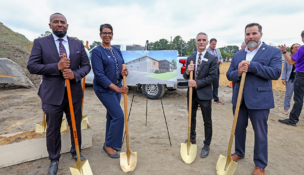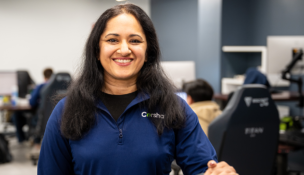A deeper look
CPAs flesh out this year’s survey
Virginia Business and the Virginia Society of Certified Public Accountants held a roundtable discussion to analyze the group’s latest Economic Expectations Survey.
This year’s CPA panelists were Dave Cotton, chairman of Cotton and Co. in Alexandria; Marty Einhorn, managing shareholder with Wall, Einhorn & Chernitzer PC in Norfolk; Clare Levison, head of Clare Levison Consulting in Blacksburg; and Gary Thomson, regional managing partner at Dixon Hughes Goodman in Richmond.
The roundtable was conducted by Virginia Business Editor Robert Powell and Special Projects Editor Veronica Garabelli in September at VSCPA’s headquarters in Richmond. The following is an edited transcript.
Virginia Business: The majority of CPAs believe that the national economy is moving in a positive direction. What are some [examples] of the positive momentum that CPAs are seeing?
Thomson: In Virginia, I think we’re optimistic because for the first time since the Great Recession we’ve seen our employment numbers return to what they were before 2007-2008. That in and of itself creates a great sense of optimism: to see people out there working, to see our clients actually have the opportunity for employment and [engagement.] It’s an important, positive sign for us.
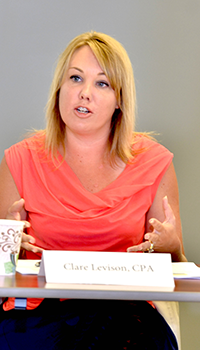
VB: Southeast Virginia CPAs have a more favorable view of the economy, 55 percent, while only 34 percent of those in Southwest have a favorable view. What do you think accounts for these differences?
Einhorn: Our economy [in Southeastern Virginia] is dependent on the government, our naval base, and that is both a blessing and a curse. The blessing being we don’t dip as low as the rest of the economy in the state or nationally when there is a recession because the government tends to remain relatively steady, except for our recent sequestration, which really hasn’t affected our economy that much. Also, by the same token, we tend to rise a little bit slower and not have as high of a peak. There’s a lot of activity in our area, a lot of construction … a lot of new jobs coming into the area. So I believe that is contributing to the optimism.
Levison: For Southwest Virginia, you saw infrastructure and geographic location mentioned in the survey. [Those] probably [are our] two big issues that [impact] Southwest Virginia. There’s not the same level of infrastructure that you see in the rest of the state. There are not as many options. We love our part of the state. We think it is beautiful, but if you have an economic situation, a job loss, a downturn, things like that, you don’t have as many second choices to turn to as you do in some of the other parts of the state.
Cotton: I’d like to echo Marty’s sentiment about the government. Northern Virginia is probably more dependent on government than Norfolk and despite sequestration [and] deficit spending, the government continues to spend money. If your primary customers are entities that can print money, then it kind of immunizes you from economic stress in the economy.
VB: More than half of the CPAs responding [in the survey] expect their clients to see adverse effects from the new Department of Labor [DOL] overtime rule. Could you comment on what effects you’re seeing with your clients?
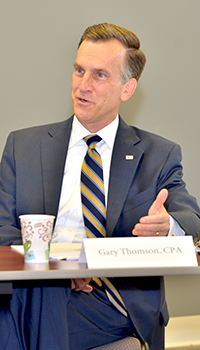
Einhorn: I also believe that a lot of the uncertainty concerned about this law is based on the timing … We’re gradually climbing out of [the Great Recession] and then to have these rules hit, there’s a lot of fear that this might slow us down or maybe turn us in the other direction. I think that has something to do with it.
Cotton: We’re also in a larger transition in terms of the employee/employer relationship. People now are asking for more flexible schedules. Not everybody wants to work the traditional 40-hour week, and I think employers are having to accommodate, adjust and acclimate to that new structure of the relationship.
VB: Last year, more than 40 percent of respondents said small businesses did not have access to adequate credit. That percentage fell to 30 percent this year. Has the credit market improved?
Cotton: We’ve had a substantial increase in government regulation of the credit market with [the] Dodd-Frank [Wall Street Reform and Consumer Protection Act] and Consumer Financial Protection agency, and I think it is more difficult to get financing approved in that greatly increased regulatory environment.
Thomson: Generally speaking, it has improved, but [there are] alternative sources of financing and capital out there that have become a greater part of our economy … I think the natural economic forces of alternative sources of financing — money being on the sidelines for a long time — have opened the doors a little bit. Now, not unlike prior years, if you don’t have a lot of equity or a lot of something to back up that money, it’s still going to be a difficult market, but at least they’re seeing more options out there.
VB: There is danger that Virginia could see the full force of sequestration coming in future years. How would that affect the state’s economy?
Einhorn: It will affect the entire state but specifically Northern [and] Southeastern Virginia. We would be dramatically affected because the way they have implemented it in the past. It’s not incremental. It is in very large jumps, for example, deciding to close down an entire base or close down a fire squadron or move them, and so it’s something that is very unpredictable, and I think it would have a major impact on the state’s economy.
Thomson: We’ve already seen a significant dip from either direct sequestration or just a peel back in government funding. The good news is that has created opportunities, particularly when you look at technology, cybersecurity, other fields that are beyond the federal government. But even with all that positive reaction, we still are the largest per-capita recipient of federal funds. So it, by nature, will have a significant impact, and it cascades through all of Virginia.
VB: This year and last year, the survey showed that CPAs are frustrated by political partisanship at the state and federal level, saying it prevents government from addressing urgent needs. What are some of the needs that are being neglected because of political gridlock?
Cotton: What concerns me is that — a product of the partisanship and gridlock — is that we’ve stopped talking about the fiscal uncertainty in the future. Our clients, our businesspeople, they understand that you can’t consistently spend 40 percent more than you take in, and I think there’s a looming crisis. I’m not sure exactly how it’s going to get resolved. It’s going to have to get resolved.
Levison: A piece of that is educating the public about the financial literacy associated with overspending, with government overspending. Trying to do that in a nonpartisan way, which I think CPAs have done an excellent job, because, at some point, you feel it’s going to have to come from the people pushing it to the government because the government doesn’t seem to be doing it on their own … You wouldn’t be able to survive your own family finances if you [overspent]. I think there is a huge financial education piece that comes along with breaking some of that gridlock, so people understand it’s not a Republican or Democratic issue. It’s just basic math.
VB: Infrastructure, and health-care costs remain the most pressing issues in Virginia according to the survey. Why do those issues continue to rise to the top? Do you see any problems with change?
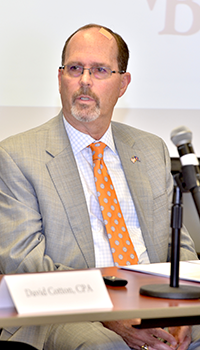
When it comes to infrastructure, we’ve been through this period of decades of not doing our deferred maintenance. We have relied on the engineering and infrastructure dollars that we spent back in the last century to carry us through until we’ve built up this tremendous liability, deferred liability, that is affecting every part of the state, and the prospect of us growing in a double-digit economy is almost scary because the infrastructure is so far behind that.
We’re in a mode right now, I believe, of just trying to catch up to where we should be. It doesn’t affect the people within the state nearly as much as it affects people who are considering locating into the state, because they look at where we are and what our deferred maintenance is, and they say, “Well, I have other options. I can go somewhere else [where they’ve] chosen to make those investments.” It’s very much at the top of my region’s mind, and I’m sure it is also at the top of the minds of the entire state.
Cotton: We’ve had some issues in Northern Virginia that illustrate just how fragile our infrastructure status is. We’ve had some issues with Metro trains catching on fire, and so Metro shut down the entire system for two days to do inspections of the system, and, during that period of time, there was traffic gridlock all over Northern Virginia, all over the D.C. metro area. It just illustrates that some minor shutdown in any of our traffic systems is going to have a profoundly disruptive effect on everybody’s business.
Thomson: There’s a [a diversity of opinions across the state in terms of what we need to fix]. In Northern Virginia, they’ve been talking about something that none of the rest of us can relate to, which is a mass transit system. They also have this incredible airport, Dulles airport, that I am pleased to see the governor putting some funding into revitalizing Dulles, a critical corridor for us. But when you move out to Clare’s region, in that area [where there’s] traffic on 81, traffic on 64. How do we get new roads back to the great natural resources they have? When you get to Marty’s region, how do we get another tunnel crossing or something to protect us in case of a natural disaster with just the pure stresses that the infrastructure of the port will put on it?
Each one is different. Back to the question of partisanship [that was asked earlier]: There are some really good things that happened where they set partisanship aside, but at the same time, it becomes very regional in where do we want the money to go? My sense is if you talk to the four of us — based on where we live and geography — we would have a different priority.
There’s a unanimity that we need to fix infrastructure, but the complexity gets into what do we fix first and all of them have extraordinarily big price tags that come along with it.
Levison: In our part of the state, we’re very excited at the thought of the Amtrak extension and also just basic transportation things like more direct flights to New York City from [Roanoke-Blacksburg Regional] airport. So you’re right. It varies. What people think is that [it] might seem so basic, Amtrak and extra direct flights, but it’s significant for people in our part of the state to be able to have greater access to do their business.
VB: More than 81 percent [of survey respondents] see Virginia’s business climate as good or excellent compared to neighboring states. They also don’t see any reason to lower the commonwealth’s tax rate. Why do you think CPAs are satisfied with current conditions?
Cotton: In Northern Virginia our competition is the District of Columbia and Maryland, and we have by far the best tax climate among those three, and I think we tend to be optimistic for that reason. I’m not so sure about everybody agreeing that the tax rate in Virginia is just fine right now. We’d all like to see it get lower, but I think our environment up there is, [if] you’re going to start a business, you’re looking at starting it in D.C. … Maryland [or] Virginia. My view is, it’s not really much of a choice. Virginia is by far the most business-friendly of those three governments.
Thomson: What’s not to love about Virginia? When you step back, despite all the good analysis we’re trying to give about the things that maybe aren’t working well, you draw a circle around Virginia about 500 miles, and you’re picking up many, many significant major markets in the U.S. We’re the northernmost right to work state [on the East Coast], so we don’t have some of the issues to deal with that other states do … Overall, whether you’re looking at gas tax rates or at our state income tax rates, we are very competitive.
Einhorn: In addition to our neighboring states, people compare our commonwealth government to the federal government. I think they feel like they’re getting a better bang for their buck in Virginia, even though most people would like it to be more efficient. It seems to be operating more responsibly than the federal government. Therefore, it seems like there’s a lot of attention on lowering my federal taxes. I do believe that the bipartisanship would help us tremendously to get better leverage out of the tax dollars that are being collected today.
Levison: I agree we do have a great state. In our part of the state, we have the opportunities afforded to us by some fantastic public schools. Virginia Tech, Radford University really bring a thriving business climate to an area that would typically otherwise be quite rural and not have as much of a global mindset or many technology initiatives. So, we really benefit even in our corner of the state. There’s a lot going on and a lot to offer businesses.
Thomson: The thing that I would add on taxes is two years ago the Virginia Society of CPAs, working with the legislature, helped reform the way Virginia approaches taxation on international business. If you think about the current tax code, it really is a 20 [to] 30-year-old tax code … VSCPA did a great job helping reform that, but there [are] other elements that maybe need change to be more attractive to the new economy, whether it’s cybersecurity [or] information technology, when we’re dealing with businesses overseas … I think that’s more [of a] forward thinking aspect of taxes as opposed to just, “lower my rate.”
VB: Was there anything that stood out in the survey that we haven’t discussed?
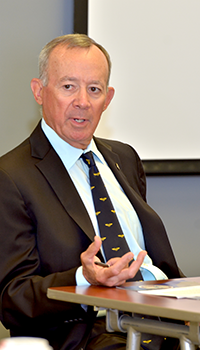
The environment I grew up in — the tradition was you found yourself a career and stayed with that company a long time. I remember when I was in charge of recruiting [when looking at people’s résumés], if they had a history of changing jobs pretty often, I’d discard those. We can’t do that now. Kids today will change jobs every year, and it’s very difficult to compete in that environment. What we’re seeing in the group of firms that we compete against is our people are moving amongst those firms, and it’s a very difficult thing to manage.
One of the things that we’ve done to address that is we began participating in “Best Places to Work” surveys. It was nice to get the awards, but more important was we were learning how we could make our employment environment more favorable. That’s been beneficial, but still we’re seeing a lot of churning of people moving from firm to firm, and I don’t know the solution to that.
Einhorn: We have a different issue when it comes to the talent. Our area struggles to attract quality talent, and I’m not just talking about CPAs. I’m talking about talent in every area because the rest of Virginia and the rest of the East Coast sees us as a Navy town. They see Virginia Beach as a resort, and they see Norfolk as a Navy town. Getting people from outside of the area to come and experience what we have to offer is a real challenge.
Another surprise that I saw in the survey was the fact that so many people responded that they did not know whether the economic revitalization efforts in Southwest Virginia had made a significant progress in the economy. I think that highlights the regionalism that we deal with and the fact that we tend to only focus on our own region. I believe we can help break this partisanship, if as businesspeople, we work more closely together as a state. I think the VSCPA, for example, and also Virginia Business do a very good job of trying to unite us all, but the legislature doesn’t necessarily do a great job of that. Education and cooperation is something that we’re probably in need of.
Levison: That’s the same result that I picked up on. The rest of the state said that they didn’t know about those economic efforts, and in Southwest Virginia people said, “No, the economic revitalization efforts have not been a significant progress in the economy.” What I also thought was interesting is that overall, Southwest Virginia mirrored very closely the same opinions of the rest of the state, which I think is a good thing for that unification and for everyone being on the same page to move forward. It might be more difficult if you saw the people in that region had completely different sets of concerns that were not really on the priority list of other parts of the state, but everyone’s concerns seemed to be pretty closely related to the same top issues and that I think is a positive thing for progress.
Thomson: When we talk about job growth and job creation we tend to think of new businesses coming in … What was encouraging, it’s not a shocker but a little bit of a surprise [to see that] 19 percent said we’re going to increase capital spending, and … 32 percent said they were going to increase the number of people they were hiring. The revitalization of Virginia growth is going to come from our existing businesses, particularly our small businesses, [which] I think VSCPA members and CPAs represent so well. It was encouraging to me to see our clients, our businesses that we touch every day, saying we’re going to increase capital spending, and we’re going to start hiring. If we have a couple of years of that it will be very good for Virginia.






